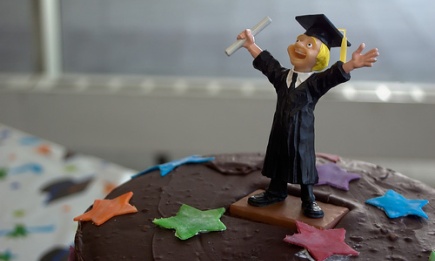Making change agents in honours

Marca Wolfensberger was one of the 2013 finalists of the UAS-Professor of the Year-election, held annually by national studentorganisation ISO and ScienceGuide. She didn’t win in the end, but still felt the urge to give something back to the students. “Dr. Kevin William Dean and Michael Jendzurski are sort of my presents to you,” she laughs when we are talking with these representatives of West Chester University.
Kevin Dean is visiting The Netherlands together with Michael Jendzurski, a masters student in communication directly involved in the honours programme at his West Chester University. Giving students a active and central role in such programmes is key according Dean. “The main concepts of honours education in my view are community, competence and freedom.”
Class ánd Community
While competence seems to be the most obvious requirement in honours education, according to Dean the key to a succesful programme is a strong community in which students have the freedom to fullfil their needs in education. This is in no way elitist, Kevin Dean stresses. “We have to remember that honours in the US started in public education.”
At West Chester University, a public university in Pennsylvania (USA), the honours programme is focused on service learning in which classroom instruction is combined with community service projects. Older students as Michael Jendzurski play an important role as they are also mentoring their younger peers. “We try to identify potential in students who are willing to become a change agent.”
The active involvement of students also applies in the policy of getting teachers to participate in the honours programme. “To get real honours students we let students help pick the teachers by giving their opinion on what makes these teacher outstanding through an illustration of a best practice. The interesting thing is that students tend to be more critical than teachers sometimes.”
Improve the whole
Students and teachers are together given a central role in the university as a whole and with this approach the honours programme at West Chester University aims to improve education all over the university. In The Netherlands honours colleges or university colleges sometimes get the reproach, that they present a separate level of education, which is only additional to the regular HE-system. According to Kevin Dean this will not be fruitful, as you “can only have good honours education after your regular education is ok.”
Marca Wolfensberger adds that she is not advocating a system of only university colleges, but adds that teachers lecturing in honours will get their experiences to improve their regular teaching. “Teachers will bring back those experiences to their classes.”
Next to teachers students are the core of improving education. “It is about being able to get an idea in to action and being able to contribute to how you define learning. The strength of honours education is in bringing together the diversity of ideas,” says Kevin Dean. “The power is in your hands, I get to say to my students. ‘I hope you’ll never get a job. Instead you should get a vocation’. That’s where hopefully this will take us.”
Meest Gelezen
Vrouwen houden universiteit draaiende, maar krijgen daarvoor geen waardering
Hbo-docent wil wel rolmodel zijn, maar niet eigen moreel kompas opdringen
‘Sluijsmans et al. slaan de plank volledig mis’
Wederom intimidatie van journalisten door universiteit, nu in Delft
‘Free riding brengt het hoger onderwijs in de problemen’

